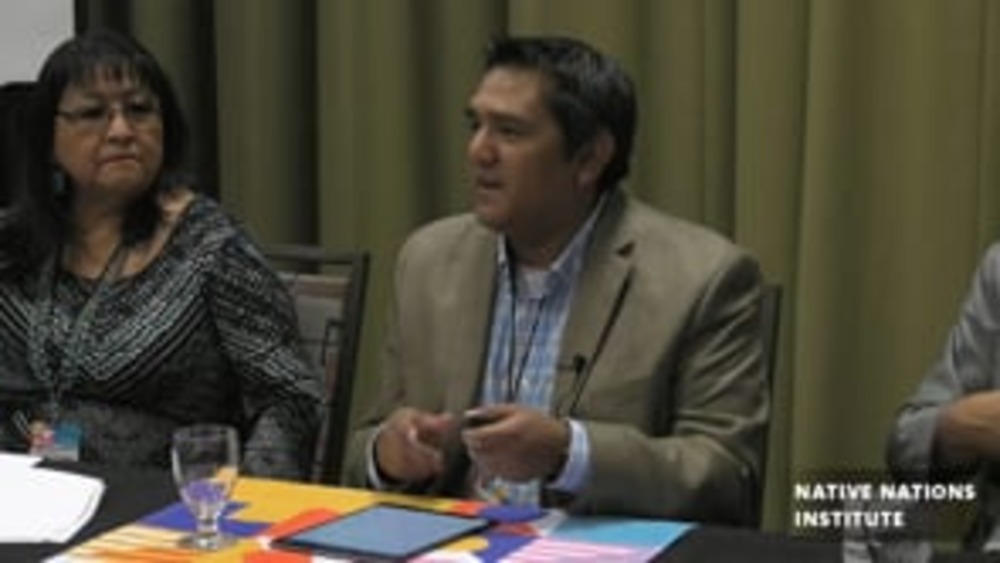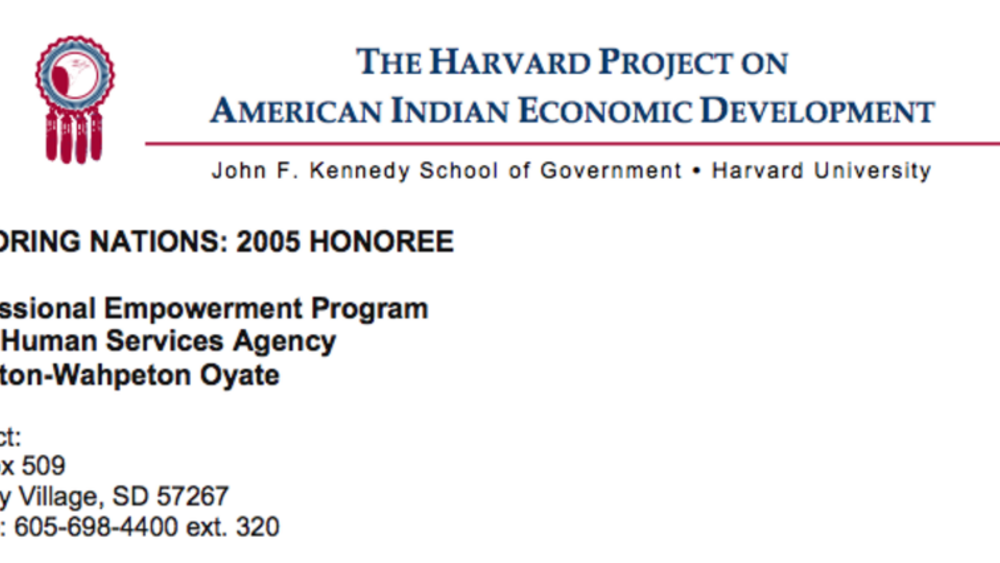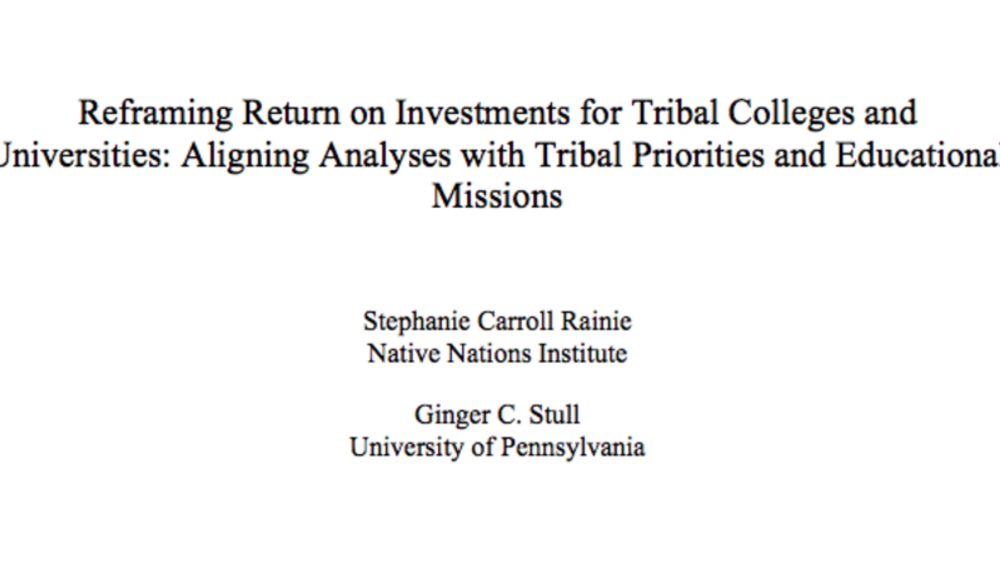Joyce Country and Dr. Dorry Larson discuss what prompted the Sisseton Wahpeton Oyate to establish its award-winning Professional Empowerment Program, and the positive impacts it is having on the lives of its citizens.
Additional Information
Country, Joyce and Dorry Larson. "The Sisseton Wahpeton Oyate Professional Empowerment Program." Honoring Nations symposium. Harvard Project on American Indian Economic Development, John F. Kennedy School of Government, Harvard University. Cambridge, Massachusetts. September 27-28, 2007. Presentation.
Transcript
Duane Champagne:
"The next presentation we have is the Professional Empowerment Program, and we're going to have I think a dual team here. We have Joyce Country and Dorry Larson will share the podium."
Joyce Country:
"Number one is, we really want to thank Amy [Besaw Medford] and the board for inviting us and having us. We were really excited to come, and we want you to know we really appreciate this time. We really have a lot of passion for what we do. We give it our all and somebody said this morning that we're all over-achievers. I believe we are. It's nothing for me to go to bed at night with a tablet beside me because I'll wake up at two o'clock and say, ‘Hey, that's a good idea! Write that down.' And then Dr. Dorry called me up, he's hunting, ‘Hey, I thought about something.' So we want things to really be exciting and passionate for our people because we learned, we learned that beating up people doesn't work. So we want them to have fun when they're starting to change their life. And I wanted Dr. Dorry to be up here today because he was the gentleman with the vision. He was the gentleman with the vision for this program. I kind of helped him after I got hired and implemented it, made some changes. And this past weekend on Sunday we had a [Dakota language], a thanksgiving, because Dorry's adopted brother had vision quest. And he made a real nice statement. He said, ‘For my brother who's a sun dancer, goes to ceremony, goes to sweats; he's the man that kind of forgot he's not an Indian.'"
Dr. Dorry Larson:
"Good afternoon. I wasn't expecting to be up here. This is really Joyce's time. I want everybody to write these things down because I've learned a lot and I'm going to share with all of you 'cause this is what you want to take away from this conference. From Joe [Kalt] I learned I'm not a yuppie, I'm a muppie. And from Alfreda [Mitre], where are you Alfreda? Before you, I thought I was healthy, but now I'm an over-functioning member of a dysfunctional family. And all of you are, too. From Al [Pemberton], I learned don't land a good plane on Red Lake. A poor plane you're going to be safe, but don't land a good plane. From Carl [Artman], the Assistant Secretary of the Department of Interior, we all need to make more wind. I'm sorry, Carl, I couldn't resist that one. That's right out of Washington, D.C. From Theresa [Pouley], get ready for the cup. And you know, I talked about being an over-functioning member of a dysfunctional family, but now, thanks to you, we know we're one of Amy's [Besaw Medford] favorites. We still haven't gotten a new bike, though.
I want to echo Chief [Oren] Lyons, what you were talking about, because that's what our program is about. Our program -- just to understand where we're at, we're in the far northeast corner of South Dakota. We're here with our brothers and sisters from Flandreau and from Winnebago and Macy. And we have opportunity. We have opportunity. It wasn't that many years ago when there wasn't opportunity. We have lots of jobs. We are now the ninth-largest employer in the state of South Dakota. Now, to put that into perspective for people that live here, that doesn't -- I mean, we have about two people per mile, so -- but we're the ninth-largest employer. If you're a tribal member and if you want to work, there's a job for you. And so when you spoke this morning, Chief Lyons, I thought a lot about what you said. Now it's about learning how to deal with that, how to deal with money, how to deal with opportunity, and that's what our program is all about. We're helping people get healthy to deal with opportunity.
And we've developed this program. It's very therapeutic in nature. I do all the work; Joyce just takes all the credit. No. Actually this woman does all the work, she does all the work, and I just want to honor that. I also want to share with you, and Chief Lyons, I'm going to pick up on what you're talking about, if you're not aware of the resource, this is a resource I'd really encourage you to look at because this is what we're dealing with and that is Ruby Payne's material on multi-generational poverty. And I suspect many of you are familiar with that. It's dealing with people -- and Joyce and I grew up in poverty, we know what it's like -- it's dealing with people that are not used to having these things that they now have. And poverty, as she defines it, is doing without resources, not just money, but support systems, and physical resources, and skill resources, and spiritual resources, and on, and on, and on, and on. And that's something that I'm really interested in.
The other thing that I heard last night for a resource that I'll share with you that really is exciting to me and that is the whole concept of resiliency. Resiliency. Emily Werner's work on resiliency. What I like about this program, Amy, is we're talking about resiliency. We're talking about what works rather than continuing to struggle and focus on what doesn't work. I always tell people it doesn't take a real master rocket scientist to say it's not working. It's like, 'Okay, what are your suggestions and what are your solutions?' And I listen to all of your programs and I've got to tell you, I'm in awe of the solutions. I want to say that I'm in awe of the solutions. When we were down in Tulsa, we got our award in 2005, once again as I joined this dysfunctional family, I still feel guilty about this, because [at] the dinner and they're making the awards and some of you know this, you remember this -- you're sitting there and they're starting to talk about different -- and then the honorees, the honors, and I turned to Joyce and I said, ‘Joyce, this is not where you want to hear your name.' And then, I started to feel really guilty, Amy. Like oh, I shouldn't be thinking this way. But we wanted high honors and we were very fortunate and very appreciative of getting this.
In closing, before I turn it back to Joyce, I told Jackie, and I told Amy, it is a gift to be here. It is an incredible gift to be here. I grew up in western Minnesota and northeastern South Dakota, and what a gift. This morning I was walking around in the Harvard Yard and I thought, ‘Wow, who would have thunk it? Huh? Who would have thunk it? Here I am.' Here we are, Joyce. So I thank you, Amy and Jackie and staff, and I hope you remember what you learned everybody. But get ready for the cup."
Joyce Country:
"We started our program in March of 2002. And it began because, we had the casinos on our reservation, but we were having a lot of turnover. We even had one individual who was rehired through Dakota Magic 17 times. And Dr. Dorry mentioned to the HR director, and I wasn't a part of it yet, and he mentioned to her that, ‘You know what, this isn't working. This is not working. You've got to do something different.' So a group of people got together, the TERO [Tribal Employments Rights Office], the college, the TANF [Temporary Assistance for Needy Families], the Tribe and Dr. Dorry, and they decided that they needed something that would work that would help people to be successful in whatever that term is to them; not to us, but to them.
And so at that point in time, they developed what we called the 'Developing the Productive Employee.' I changed that name to the Professional Empowerment Program. Thus far, we just finished our 39th class in August. And thus far, we've had 373 [employees] who have successfully completed the program. You notice I said ‘successfully.' It doesn't mean cause you come through the program you're going to be successfully completing that program. There's some declaration of expectations that we have for people that we identify, and they identify for us, that they expect out of us, and we also have identifications too. So out of that amount we had 373 [employees] that graduated. Of that amount 85 percent went back to work; 85 [percent] went back to work. Six percent went on to higher education and we're all for that. Six percent decided that they needed to work on their GED and we're for that, too. And four percent decided that it was an important job for them to stay home and be a good parent and we're for that. Because I believe that we are the key, we're the key to change. And that's what we want for people, is to be a key for change. Something's not working, something's not working for our people. And so we want to be a tool that they can put in their toolbox and use every day of their life, every day.
We do a lot of psychodrama; we do a lot of experiential therapy in our group, which runs for ten days, 58 hours for two weeks. And we want our people to have fun. And when we first started, we used to have to go and meet with the supervisors and the referral sources because they would say, ‘If you don't behave, you're going to PEP.' So we got, I got wind of that. And so Dr. Dorry and I went and we met with the managers and we met with the court, we met with different people and we said, ‘You know what? This is not a beat-up session. This is a session to help people to get to know themselves, to find out what it is that's in their way that's causing them to have difficulty in their life and causing them not to be successful for themselves, their families, their employer and most of all for us, as a Sisseton-Wahpeton member.' So now that's sort of changed. Now people come to us and they say, ‘Hey, when's your next PEP class?' They might have just been there six months ago but, ‘I want to come back. Can I come back?' And so we get a lot of self-referrals today. Our TANF rate went from, I believe it was, 47 percent -- 37 percent to 7 percent. Everybody that -- TANF and GA [General Assistance] are a requirement to come through our program to maintain your eligibility status, and what we ended up doing is, we had success. People that finished from TANF and GA got a job. They got a job and they never re-entered the system. And we've been here since 2002 and I think that's success, that's success. We did this for the YouthBuild program. And out of that amount, we had just about 63 kids from ages of 16 to 21 that came through our program, and most of them finished their GED, they went on to college, we have some working at Dakota Magic, some at Dakota Connection; so we think that that's good for them.
The sad part of this, all of this, is that we do an assessment at the very beginning of our program; we do an alcohol and drug assessment, we do a tape assessment that figures out your educational standard, and then we do a mental health assessment. The sad part of this all is that 85 percent of our people had an alcohol and drug problem. Does it mean that they're addicted? No. It means that sometimes they're abusive. And I think that that's where people in our community and in our agencies get confused, because we hear a lot about addiction on reservation, but the people that we see, it's been abuse. It's been a lot of abuse. And so when we were developing this program, I'll be honest with you, we took it to sweat. We had a ceremony for it, because we wanted this curriculum to be helpful to people, not hurtful. Because I think the people that we're dealing with come from a lot of hurtful situations. I know we did. Dr. Dorry did, I did -- come from a lot of hurtful situations. And so we wanted this to be helpful and we wanted people to enjoy coming to class, to enjoy being a part of this and being able to share some of the things that went on in their life that's been a stumbling block for them.
And we do a deal called Significant Events and in that process people, we ask people to leave those issues there on the floor. We ask them to leave them there and not carry them out with them. For those of you that go to church, it's just like confession or -- what else is there? Confession. So we want them to be able to identify where they've been, where they've been, what happened and where are you at today? We ask them to identify that. And I always tell people we're like a tree. Our roots are in the ground, we're the stem and we're the branches. And I've got to stop, okay. And so we ask them to take a look at that because those roots and stuff are our values and our ethics that guide us through our life and guide our families. But this is adaptable to anybody, any group of people. Thank you."



